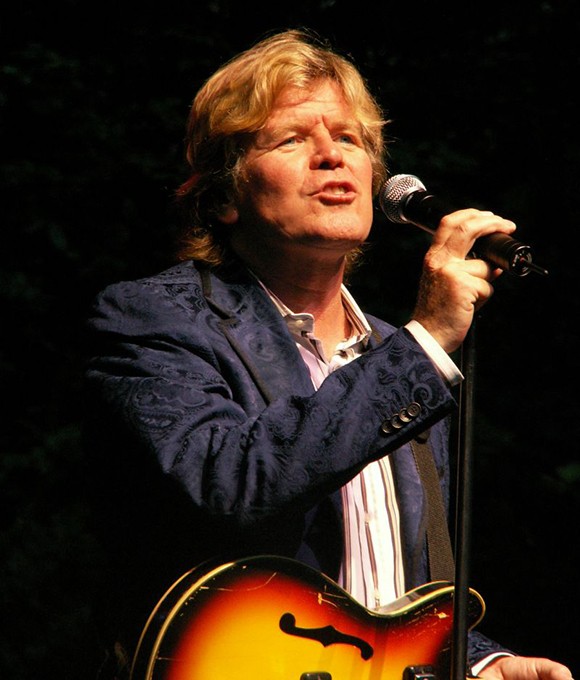50 years after British Invasion, Peter Noone muses on music’s future
IN THIS ARTICLE
- Columns Topic
- Henry Dubroff Author
By Henry Dubroff Friday, February 21st, 2014

Singer-songwriter Peter Noone of Herman and the Hermits in concert in 2007. A South Coast resident, Noone was one of the pop stars of the British Invasion. (Creative Commons photo by Cindy Funk: http://bit.ly/1hch9NP)

Henry Dubroff
For five decades, entertainer and longtime South Coast resident Peter Noone has kept alive the legacy of the band now known as Herman and the Hermits, providing the world with some of the most enduring music of the British Invasion.
The group’s hits included “I’m Into Something Good,” “Mrs. Brown, You’ve Got a Lovely Daughter,” and my personal favorite, “I’m Henery the Eighth, I Am.” One song in particular, “There’s a Kind of a Hush,” has popped up in films and at weddings the world over. And Noone still performs scores of times each year.
It turns out that keeping a vibrant life in the music business is a lot like running a small media company. There are schedules to be met, money to be sorted out and an audience to be groomed and grown. Most of all, opportunities to be seized. For Noone that meant grabbing a chance at a Sirius XM radio show as a way of keeping his brand growing.
During the past few weeks, Noone offered to spend a bit of airplane time answering a few questions from the Business Times about his life and the music business. Here’s a look at our email exchange, from, you might say, eight miles high.
Q: Does all the media around the Beatles’ 50th anniversary in America help Herman and the Hermits? How long can it keep going or are you like Sinatra — a guy with a permanent place in the music industry?
A: That was three questions. I started performing professionally in 1961 when I appeared as a child on multiple British TV series, and I saved all the money to pretend to be a musician, and slowly realized that I was a better singer than the other Cyclones (my first group) and that they were better guitarists than I would ever be. As a 15-year-old, Gerry Marsden from Gerry and The Pacemakers told me, “You aren’t a musician Peter, you are an entertainer.” I am not enjoying the Beatles’ 50th as it seems to make me feel older and I am sure it has the same effect on all the 60-plus people all over the world. On stage, I use the Stanislavski Method and become a 17-year-old Englishman, which I am managing to pull off with some success, but admit it hurts in the morning when I try to get out of bed! Like Sinatra I will continue until I can’t do it, but will not go on stage on a scooter. I hope I can continue for another 40 years!
Q: Since I met you in 2011 at the Santa Barbara Airport, we’ve both logged a lot of miles and you’ve had all sorts of new opportunities. What’s keeping you busy now?
A: I fly about 300,000 miles a year on average and flying keeps me humble, and I always expect the worst and I almost get it. I am what we English call an “entrepreneur,” which is the American equivalent of a hustler, and I am always looking for things that I like that can earn me money or stuff.
I have an unusual amount of respect for all people who do their work well, and I try to do the same, always hoping to remain civil and well-mannered, but notice I am in a small percentage of travelers these day. I write reviews for TripAdvisor as a hobby and try to be complimentary. It is getting more and more difficult to have good experiences in the business travel world. I am one of two people I have seen today wearing a jacket and not jogging clothes. The other chap is a pilot!
Q: Tell us how “Something Good” on Sirius XM came about?
I did a benefit in New York and I admit I was brilliant that night, all by myself on stage in New York, and the boss of Sirius discovered me and offered me a job, and I said yes before I asked how much, which is typical. Having a radio show is great fun and I now have another reason to request a quiet room at hotels so I can do my radio show, which is a celebration of the 60s and I just blab on and record myself as I reminisce about the people and the times. It takes about 20 hours to do a three-hour show and I am underpaid and overworked but I love talking about myself and getting paid for it.
Q: You talk on Sirius about how one key to the success of British bands was a more entrepreneurial approach to music. What do we need to see another explosion of innovation like the British Invasion?
A: The next wave of music has to be downsized because entertainment and sports have priced themselves out of the teen market. When the 60s began, most clubs like the Cavern in Liverpool and the Oasis in Manchester had no liquor license, so if you went to the Cavern you would see 13- and 14-year-old boys and girls. When alcohol became part of the financial structure the audience had to be 18 so teens slowly got their music from other sources. Most venues nowadays are not safe for children anyway, so there is no breeding ground for young talent and a young audience.
A look at the Beatles at Shea [Stadium] will show that those girls were 13 years old and safe in a stadium. I am a former schoolboy boxing champion but would not dare to go to a concert in a stadium now. So the music scene will destroy itself completely, and one day kids — as you Americans call them — will hopefully try to interact with each other in another form that requires a partner, such as dancing or playing baseball.
Q: The music business has been deeply impacted by first Napster, then iTunes and now all sorts of new channels. How has all that change impacted you?
A: I think the music business is in the best shape it has ever been in for us oldsters, as our music is now available instantly to everyone. Here’s an example: “American Idol.” I appeared and sang one of my songs, “There’s a Kind of a Hush All Over the World.” In the olden days, the record company would begrudgingly put one CD in 1,000 stores in America and another 1,000 would tell a would-be buyer “we will order it.” But, the night I was on “American Idol,” anyone who wanted a copy of my song could get it from iTunes or steal it/share it/own it. I think I sold many thousands. And I got paid for each sale because the record company can’t cheat the electronic math.
Q: What are two or three key business lessons here for a new generation of musicians trying to figure out how to survive in our fragmented, digital music world? Do you think about China or Russia as a whole new market?
A: The only way a new artist can make it is to be an artist. There will be flashes in the pan who will make loads of money with the one or two years of fame, but if they are artists they can take their time and have a wonderful life being an artist!
I have a daughter who is an artist and I am a patron of the arts. She has talent and may just need some good luck, and we have lots of manuscripts.
Q: You’re known as one of the generous blokes who’ve reached out to help other pop and rock figures who were coping with health or money issues. Is there kind of an informal network of stars who help out? How does that happen?
A: None of the people in the informal network want to be named for fear of opening the floodgates of beggars. My friend Mike Smith (from the Dave Clark Five) got in trouble with medical issues and I helped him out with the knowledge that there will be many, many future opportunities. If you would like to help out some poor starving uninsured musician, I have a list. It is a fact that some entertainers do not plan for the inevitable end, and sometimes leading a life surrounded by drugs and alcohol and wild girls in leather mini skirts may cut a few years off your gym membership bill.
Q. My wife loves your radio show because of your wit and clever insights. Do you have writers?
A. It is all stream of consciousness and some of my stories are true. I have had a full and fun-filled life and it is a pleasure to tell my listeners about it and my interactions. My mum told me that “if you don’t have anything nice to say about someone, then say nothing.” Some records I have nothing nice to say about the artist but I like the record. Those are the titles that I just play.
Q: How do you listen to music and how do you keep your performances fresh? The only person I’ve seen having more fun on stage was Ringo on Sunday night a few weeks ago.
A: I have my ear pods and I listen to music almost all the time. I am uninterrupted today as I am on a 12-hour journey and I will enjoy eight hours of shuffled music, which will take me through Elizabeth Schwartzkopf to Gerry and the Pacemakers in no logical order.
I have every Apple product and replace them all, as they fizzle by the latest product they invent. We rehearse every concert the afternoon of the show and it’s fun. Often we rehearse a song all day and try it out and then dump it, just like artists. I do have a lot of fun on stage, but remind you that my job is to make something look easy and fun although it isn’t.
Q: I was amazed by the Grammy’s TV special on the Beatles’ 50th — the music held up brilliantly. What surprises you most about the state of music today?
A: I am not surprised that the Beatles’ material has endured the 50-year voyage. I am surprised that millions of teenagers haven’t found a substitute for their grandfathers’ music.
The music business now is a bit like the period right before the Beatles broke, when there was a lot of talent around but no enthusiasm. I think that’s the missing link. The audience has also lost enthusiasm.
This leaves a big opening and it wasn’t filled by Justin Bieber or One Direction because we don’t hear their songs. Once we all heard the same music and then made a choice. Now we choose the music first.
• Contact Editor Henry Dubroff at [email protected].











